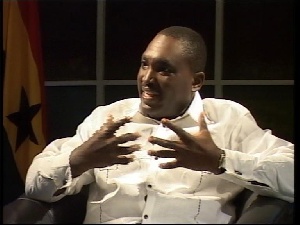Ghanaian motivational Speaker, Charles Sam says some Nigerian Governors, according to his intelligence, are supporting fundamentalist Islamist militant terrorist group Boko Haram.
Speaking on One Nation, a segment on the XYZ Breakfast Show on Friday, September 27, 2013, Mr. Sam said the terrorist activities of Boko Haram are festering in the West African country because the group has support within the federal government of Nigeria.
“…The Boko Haram situation in Nigeria has spilled over so badly because there are collaborators in the Nigerian government with those people,” Mr. Sam claimed.
He added: “There are Governors who are supporting these things quietly. It is a fact!”
Mr. Sam’s revelation comes days after another Islamist terrorist group, al-Shabab attacked and killed at least 67 non-Muslims in the Westgate shopping mall in Nairobi, Kenya.
Ghanaian literary figure, Prof. Kofi Awoonor was one of those killed in the attack.
His son, Afetsi, escaped with at least 175 others with bullet wounds and different degrees of injuries.
It has now emerged in Kenyan media that the country’s Cabinet was warned about the attack a year ago through intelligence.
The al-Shabab attack has raised concerns in Ghana about a possible attack on Ghana by Islamist group, especially concerning the country’s contribution of troops to fight Touareg insurgents in neighbouring Mali.
Ghana’s proximity with Nigeria, where Boko Haram is very active, has heightened the fear of an attack.
Fresh Boko Haram Attacks
On Saturday, many students were feared dead after suspected Islamist gunmen struck a college in north-eastern Nigeria.
The students were shot dead as they slept in their dormitory at the College of Agriculture in Yobe state.
North-eastern Nigeria is under a state of emergency amid an Islamic insurgency by the Boko Haram group.
Boko Haram is fighting to overthrow Nigeria's government to create an Islamist state, and has launched a number of attacks on schools.
The number of casualties in the latest attack is unclear but there are fears the death toll could be high.
One hospital source in Yobe's state capital, Damaturu, told Reuters news agency that 26 bodies had been brought there.
College provost Molima Idi Mato told Associated Press the death toll could be as high as 50, adding that security forces were still recovering the bodies and that about 1,000 students had fled the campus.
A military spokesman in Yobe state, Lazarus Eli, told Agence France-Presse the gunmen had also set fire to classrooms.
The college is in the rural Gujba district.
In May, President Goodluck Jonathan ordered an operation against Boko Haram, and a state of emergency was declared for the north-east on 14 May.
Many of the Islamist militants left their bases in the north-east and violence initially fell, but revenge attacks quickly followed.
In June, Boko Haram carried out two attacks on schools in the region.
At least nine children were killed in a school on the outskirts of Maiduguri, while 13 students and teachers were killed in a school in Damaturu.
In July in the village of Mamudo in Yobe state, Islamist militants attacked a school's dormitories with guns and explosives, killing at least 42 people, mostly students.
Boko Haram regards schools as a symbol of Western culture. Its name translates as "Western education is forbidden".
Who are Boko Haram?
The group was founded in 2002. Its official Arabic name, Jama'atu Ahlis Sunna Lidda'awati wal-Jihad, means "People Committed to the Propagation of the Prophet's Teachings and Jihad".
It was initially focused on opposing Western education.
It got the nickname Boko Haram, a phrase in the local Hausa language meaning,
"Western education is forbidden".
It launched a military operations in 2009 to create an Islamic state across Nigeria.
Its founding leader Mohammed Yusuf was killed in the same year in police custody.
He was succeeded by Abubakar Shekau, who the military wrongly claimed in 2009 had been killed.
The group is suspected to have split into rival factions in 2012.
The Nigerian Military claimed in August 2013 that Mr Shekau and his second-in-command Momodu Bama have been killed in separate attacks; no independent confirmation.
General News of Sunday, 29 September 2013
Source: XYZ













